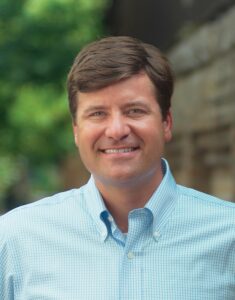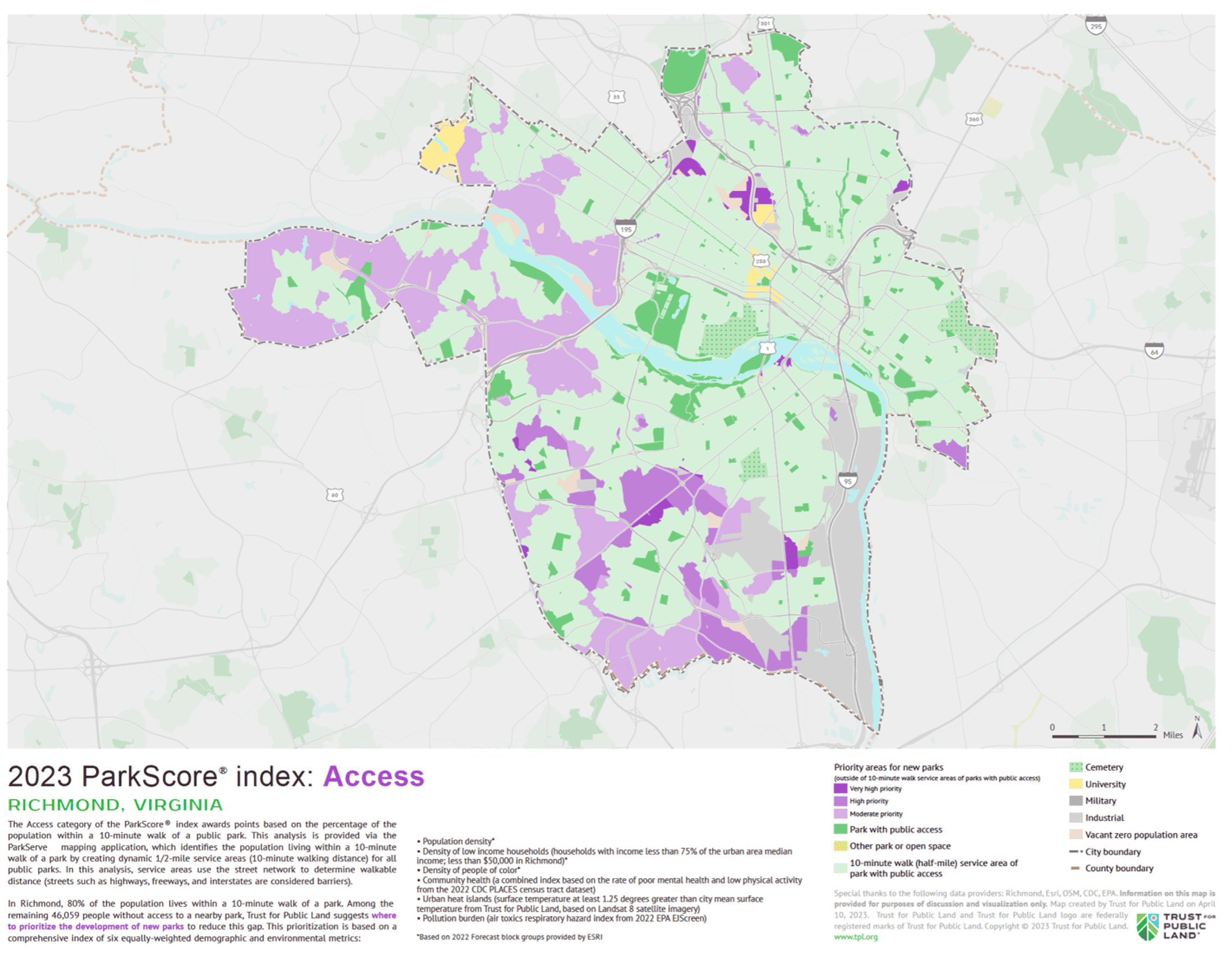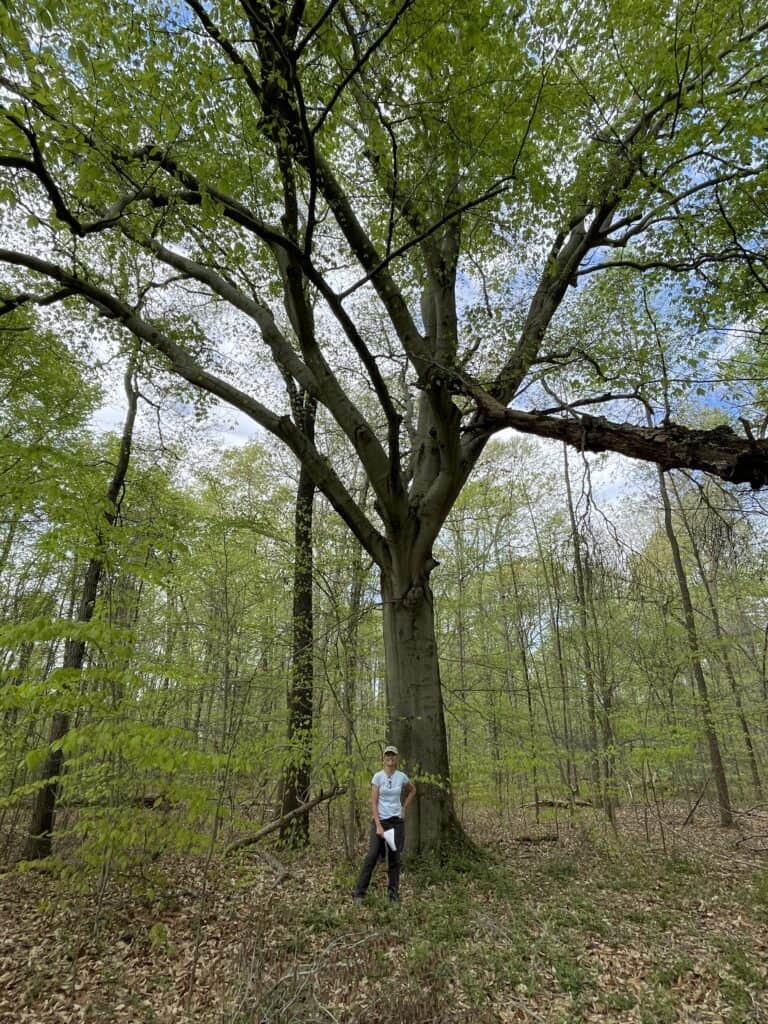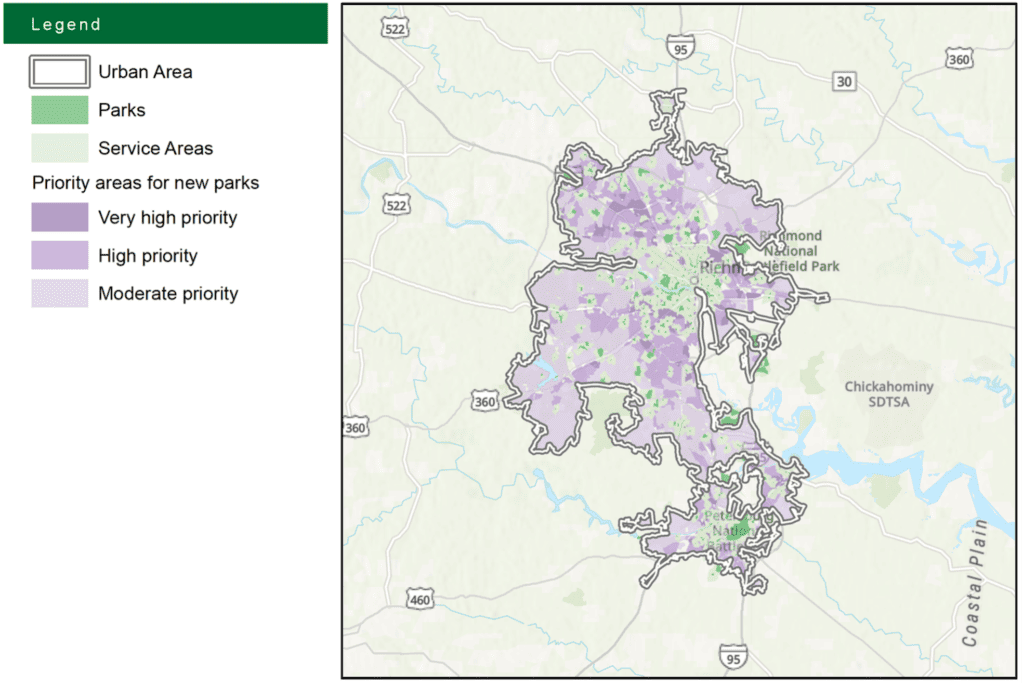The 2023 ParkScore report is out from Trust for Public Land. How did the City of Richmond compare with the 100 largest cities in the United States? Richmond ranked 39th with a score of 55.7! That’s up from 45th in the previous report. (ICYMI: Washington DC ranks 1st, Arlington 5th, Atlanta 28th, and Baltimore 29th. Behind Richmond are Virginia Beach 49th, and Norfolk 52nd.) Over the past 5 years, Richmond’s ranking has gone up from 58th in the 2018 report with a score of 44.9.
In 2017, Mayor Levar Stoney pledged to provide parks to all Richmonders within a 10-minute walk of their home. Greenspaces in neighborhoods within a 10-minute walk are a highly valued and precious resources. Ten minutes is the average time people are willing to walk to reach a destination and is the average distance (0.5 mile) that the National Park Service and Center for Disease Control and Prevention use to link park access and public health. Faced with limited mobility, health issues, or lack of sidewalks and pedestrian crossings, the distance many people in our community can safely travel to a park may be even shorter.
Exposure to nature improves physical, psychological, and social health; is critical to child development, and builds stable communities. According to a recent report from CityHealth and the Trust for Public Land, access to nature provides documented health benefits including decreased risk of heart disease, depression, and anxiety. In addition, equitable access to nature positively addresses environmental justice, clean air, urban heat islands, and recreational opportunities.
These benefits don’t just come from cleaner air and water provided by healthy natural areas. Park facilities such as walking trails, outdoor gyms, and sports fields promote physical activity. Natural features offer opportunities for creative play for children while programs and activities such as community gardening, organized sports, and yoga classes get people of all ages active and form positive community connections.
Before COVID-19 spotlighted the need for public outdoor spaces, the Mayor’s Green Team had brought together city agencies, including Parks and Recreation and the Office of Sustainability, with non-profit organizations such as Capital Region Land Conservancy to make progress towards the goal of a 10-minute walk to a park. CRLC has since been working to increase equitable access to nature, particularly in urban settings and environmental justice communities. CRLC has acquired several parcels in South Richmond, mapped out trails that could connect these greenspaces, and begun the process to transfer ownership to the City for future public access as parks and open space. Black, Hispanic, and low-income communities will benefit the most from these projects, according to the Trust for Public Land’s ParkServe model which displays a 10-minute walk model and community demographics.
According to ParkServe, approximately 80.1% of the population has access within a 10-minute walk to any of the City of Richmond’s 175 parks or 2,755 acres of parkland. In addition, the modeling identifies demographics such as Race/Ethnicity, Age, and Income of households with 83% of low-income, 78% people of color, 77% of youth living within a 10-minute walk of a park. However, the median size of Richmond’s parks is 4.7 acres, which is one of the reasons that Richmond’s overall score is low.
CRLC can use ParkServe to model how a future public park might increase equitable access. By drawing a polygon in the GIS mapping system, and even creating trails to connect to neighborhoods, CRLC has been able to evaluate properties that can help further address the City’s needs. For example, the 13 acres on Warwick Road that CRLC acquired in 2020 for a future park would provide a park within a 10-minute walk of 1,572 residents who previously did not have such access. Of these, 30% are Youth, 57% Adults, and 13% Seniors; 60% are Black, 26% Hispanic, and 9% White. 59% are low-income, 18% middle-income, and 23% high-income.
CRLC continues to use ParkServe to explore future opportunities including a 16-acre site that would serve another 1,310 City residents currently without access to a park within a 10-minute walk. In fact, the latest version of ParkServe now allows CRLC to evaluate other cities, towns, and villages in the Richmond region. The bottom line: we have a lot of work to do.
Just 33% of the population in the Richmond urban area has access to a park within a 10-minute walk. A closer look shows the following percentages of populations living within a 10-minute walk of a park in their respective locality:
That said, CRLC’s recent acquisition of 42+ acres along the Appomattox River to become a future public park in Chesterfield County is shown to double the population living within a 10-minute walk of a park in Ettrick to 54.7%. This land will serve 3,866 residents of which 2,173 previously did not have such access. This property will also serve as a safe haven for over 500 local wildlife species, including blue heron, yellow-bellied sapsucker (woodpeckers), and many species of frogs and turtles.
ParkServe is a powerful tool available for planners to assess opportunities for future parks and open space. With such a great need for parks, it important to protect existing parks and additional tracts of land from development so that they may serve the public for generations to come. Using ParkServe to center equity into land conservation efforts can help boost park access and help reverse the effects of red-lining on marginalized communities that have lasted for half a century. Since 2005, CRLC has worked to save nature for all people, and we look forward to continuing this important work long into the future.

Parker Agelasto
CRLC Executive Director



